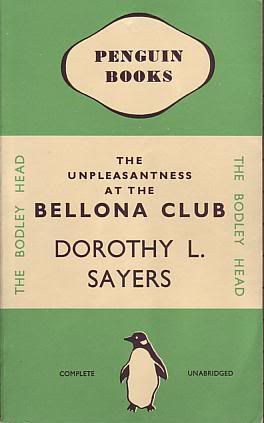
The Unpleasantness at the Bellona Club was written in 1928 by Dorothy L. Sayers and is the fourth of the ten novels featuring her detective Lord Peter Winsey (my favourite detective- I shall write a post about him as soon as I've finished writing my term papers).
The story begins on the evening of Remembrance Day with the discovery of the body of General Fentiman in his favourite chair at the Bellona Club, who has been dead for several hours but no one noticed. The problem is that the General's wealthy sister, Lady Dormer, had died that morning at 10:37 and according to her odd will, the bulk of her estate would have passed to the General had he survived her and if not, then the bulk would pass to her distant relative and ward Ann Dorland. Lord Peter, being a member of the Club and known for his powers of deduction, is therefore asked to ascertain which sibling died first in order to resolve the legal difficulties before the affair turns into a public scandal. Naturally he finds that the General had been murdered by someone who knew of Lady Dormer's will.
The novel itself addresses several issues and fads of the day. Sayers' biting wit is largely directed towards Ann Dorland, who is trying to be a bohemian modern artist, but she has neither the personality nor the talent to be successful. Using monkey glands for improving health also pops up several times as does Sayers' critiquing her own genre of detective stories.
What is largely forgotten in literature studies and by mystery fans is Sayers' genuine portrayal of the lasting effects of shell-shock on those who returned. The General's younger grandson, George, is rather badly affected and is unable to hold down a job. Instead his long-suffering wife Shelia has to go out to work, which George is grateful for but is unable to cope with being supported by his wife. As such, Sayers' has preserved the attitudes towards women supporting the household in the interwar period. We can see that those of the General's generation (who fought in the Crimea and Boer wars) view George as being weak and a failure for not fulfilling his expected role, but George's own contemporaries who fought in the Great War are understanding of the situation that George, being permanently disabled, is unable to work and must be supported by his wife as he is too proud to accept hand-outs from Lord Peter (who was also shell-shocked, though not as badly).
I found the novel to be funny in some places, particularly with the portrayals of the older members of the Club, who are most upset that the General died there, rather than having the decency to die at home.
The novel was adapted into 4 BBC episodes in 1972 starring the vastly underrated Ian Carmichael as Lord Peter. I think that the Ian Carmichael adaptations of five of the Wimsey novels are, along with Jeremy Brett as Sherlock Holmes, the best television mysteries around, because they get everything right, from the plot to the characters to the costumes and they're not painful to watch, like it is with whatever ITV is currently doing with it's Agatha Christie adaptations. If you don't have time to read the book, then I would recommend watching the adaptation, which should be available from your local library.
This is the only clip I could find online:

No comments:
Post a Comment